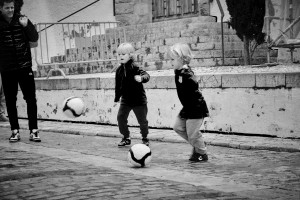Can you imagine a 3rd grader teacher screaming at your child for trying a math problem they have not yet learned to solve?
My son failed this weekend and I was so proud of him for doing so.
Unfortunately, while I was in awe of his courage his coach was screaming at him. Let me explain how the very same event can be a point of pride for his father and a point of disgust for his trainer.
My boy sprinted down the right flank toward the goal as Jan, the left winger, centered a low driven ball toward the top of the box. Jordan beat his man by a step and as the ball came across he took his best effort with his left foot. Between us we call it his LD referring to his left foot being his Less Dominant foot. The ball did not find the back of the net as he had hoped and it passed listlessly just wide of the goal. This was the fabulous moment that made me so proud.
The coach recognized that my eight year old could have put the team in the lead if he maneuvered the ball to his right foot and shot with his dominant foot. After all we were tied 0-0 and winning is everything, right?
“Jordan!” with disgust whistled its way across the field from the lips of his coach and landed painfully in the heart of my child. To his credit, my son has become a bit immune to nonsense by now and he would ask me of the situation in the car on the way home.
“Papa, did you see when I missed the goal in the first half?”, he asked.
“Yeah, and I thought that was brilliant!” I replied.
He knows by now exactly why I was so proud of him. The game determines with which foot you should strike the ball, not the coach. This situation demanded a left footed shot and my son delivered. Not well, but he obeyed the beautiful game and gave it his best go with his LD. Ironically, later in the game, he flicked one past the keeper with his LD on a short post run and the coach seemed OK with that tally.
I share this because so many times our players fail for the wrong reasons. They avoid at all cost that which the game requires by cutting the ball back to their strong foot. Mostly just to avoid the embarrassment of what might happen – like missing a goal. Or being yelled at, for example.
When they fail for the right reasons I like to call this “failing for the future”. Today, my son made the right decision and failed for the right reason. He may not master this LD shooting today or even this year, but he will master it in the future if he has the courage to fail now for future success. All will be well if he meets the call to action with the foot that is called into action.
I would rather have a coach that encourages children to work on their weaknesses and to fortify their strengths but that is not the case this year. If winning is about short term results only then I prefer to change my definition of success.
Can you imagine a 3rd grader teacher screaming at your child for trying a math problem they have not learned yet to solve?
How long would that teacher stay employed? Not long I would imagine. We do not accept it in our schools and teachers would not berate a child for giving their best – whatever their best may be at the moment.
Imagine instead a group of players praised for taking risks and supported when they try their best for the right reasons. Imagine coaches doing what teachers do when they guide their students on a road of discovery. Imagine working through the problems you cannot solve today and finding solutions for tomorrow.
Failure is just a symptom of a skill unmastered and nothing more.
In fact, failing is only failure when we do not see it as a positive part of the learning process. So, while my son may have not scored the goal of his dreams, he will someday and I will be there to remind him of a time when he was eight years old and had the courage to fail for his future.
